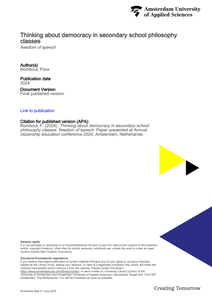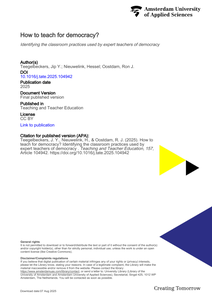Effective teaching for democracy requires an understanding of the teaching methods and educational characteristics that are effective in interventions. In order to address this requirement, we conducted a systematic literature review. We used an extensive search syntax and snowballing method that allowed us to find n = 2093 unique publications. After a screening process, we have included 54 interventions in 51 different quantitative effect studies written between 2010 and 2020. We categorized these interventions into five types of teaching methods: instruction, small-group work, assignments, projects, and democratic decision-making. We analyzed what the educational characteristics (i.e., subject matter, classroom interaction, classroom management) of these interventions were and for which democratic competences (i.e., knowledge, attitude, skill, behavior) they were effective. Our results show that teaching methods have differential effects on democratic competences. We also discuss the robustness of these results. Our study shows that there is still much to be gained in terms of research designs, the conceptualization of democratic competences, and the description of teaching methods.
MULTIFILE

The views young people have towards democratic values shape their views in later life. However, the values that are fundamental to democracy, such as majority rule and minority rights, are often competing. This study aims to provide insight into the ways adolescents view democratic issues in which democratic values are competing. To do so, three democratic issues with varying conditions were designed, and discussed during interviews with students in vocational education. The results show that most adolescents consider both democratic values that underlie an issue. Furthermore, as the conditions in which the issues take place were altered during the interviews, adolescents explicitly evaluated different perspectives and starting shifting between both values. The findings of this study show that adolescents’ views on democratic issues are layered, and include considering multiple democratic values and taking account of the conditions in which these are situated.
MULTIFILE

Sustainability is one of the most important challenges of our time. How can we develop prosperity, without compromising the life of future generations? Companies are integrating ideas of sustainability in their marketing, corporate communication, annual reports and in their actions. The concept of sustainability has more recently also been linked to project management. Studies show that considering sustainability should not be regarded a responsibility of just the project sponsor or executive, also the project manager has a strong influence on the sustainability aspects of a project. Mary McKinley stated already at the 2008 IPMA World Congress that “The further development of the project management profession requires project managers to take responsibility for sustainability”. This paper builds upon this vision, by exploring the concept of sustainability and its impact on the competences of the project manager (based on the ICB3). It aims to provide guidance on how the standards of project management competencies should integrate the concepts and principles of sustainability.
DOCUMENT

Philosophy is an elective subject in secondary education in the Netherlands, which is not often studied in the context of citizenship education. This is probably because only a minority of students participate in philosophy classes in the upper grades of secondary education (approximately 2-5% of all students). However, especially in the years 2022-2025 philosophy is particularly interesting for those studying how citizenship education can be taught, because the higher general track students study a range of philosophical ideas about democracy for their final exams (Spoelstra et al., 2021).This paper presents a qualitative analysis of three philosophy classes about freedom of speech. The lesson transcripts, pre- and post-observation interviews with 3 teachers and 15 students (5 from each class) are coded thematically with a framework for four teacher responsibilities during philosophical discussion in moral education. These four responsibilities are: teachers have an organizational responsibility to facilitate lesson activities such as classroom dialogue to facilitate thinking about democracy, an epistemic responsibility to warrant valid reasoning and recognition of established facts during the lesson, a pedagogic responsibility to create a safe and open classroom climate and a moral responsibility to find the right balance between value communication and stimulation (Leenders & Veugelers, 2004; Rombout et al., 2022; Sprod, 2001). The main research question was: how do philosophy teachers realize these four responsibilities to facilitate their students’ thinking about democracy in a lesson about freedom of speech and how to teacher and students evaluate these responsibilities in this lesson?The findings contain rich descriptions of lesson activities such as considering borderline cases, facilitating teacher-led dialogue, organizing debate, and learning about philosophers’ arguments. These are supplemented with reflections of the participants on teacher neutrality and how open and safe the classroom climate was during these lessons.
DOCUMENT

To stimulate democratic competences through teaching, it is necessary to have an understanding of actions and behaviors that are considered effective in teaching methods. In this study, we investigated these actions and behaviors, referred to as classroom practices, by interviewing 20 expert teachers of democracy in the Netherlands. We identified six relevant practices: meaningful embedding, providing multiple perspectives, thinking about solutions from divergent perspectives, independent information collection and presentation, taking socio-political action, and critical reflection on subject matter. We show how these practices are associated with democratic competences and provide examples of how the practices are implemented in teaching methods.
DOCUMENT

This article aims to gauge students’ perceptions of the Dutch Party for Animals (PvdD) in order to reflect on the political representation of nonhumans (animals). The support for political representation of nonhumans is based on the ethical underpinning of deep ecology; growing recognition of the importance of sustainability; and increased societal support for animal rights and welfare. This article reflects on these developments using Bachelor students’ assignments from a Sustainable Business course, which asked them to reflect on the underlying principles of the PvdD. Student assignments indicate that educational efforts targeted at fostering ecological citizenship have a positive effect on the recognition and acceptance of ecocentric values. https://doi.org/10.1163/15685306-00001660 LinkedIn: https://www.linkedin.com/in/helenkopnina/
MULTIFILE

This article aims to gauge students’ perceptions of the Dutch Party for Animals (PvdD) in order to reflect on the political representation of nonhumans (animals). The support for political representation of nonhumans is based on the ethical underpinning of deep ecology; growing recognition of the importance of sustainability; and increased societal support for animal rights and welfare. This article reflects on these developments using Bachelor students’ assignments from a Sustainable Business course, which asked them to reflect on the underlying principles of the PvdD. Student assignments indicate that educational efforts targeted at fostering ecological citizenship have a positive effect on the recognition and acceptance of ecocentric values. https://doi.org/10.30560/sdr.v1n1p11 LinkedIn: https://www.linkedin.com/in/helenkopnina/
DOCUMENT

What you don’t know can’t hurt you: this seems to be the current approach for responding to disinformation by public regulators across the world. Nobody is able to say with any degree of certainty what is actually going on. This is in no small part because, at present, public regulators don’t have the slightest idea how disinformation actually works in practice. We believe that there are very good reasons for the current state of affairs, which stem from a lack of verifiable data available to public institutions. If an election board or a media regulator wants to know what types of digital content are being shared in their jurisdiction, they have no effective mechanisms for finding this data or ensuring its veracity. While there are many other reasons why governments would want access to this kind of data, the phenomenon of disinformation provides a particularly salient example of the consequences of a lack of access to this data for ensuring free and fair elections and informed democratic participation. This chapter will provide an overview of the main aspects of the problems associated with basing public regulatory decisions on unverified data, before sketching out some ideas of what a solution might look like. In order to do this, the chapter develops the concept of auditing intermediaries. After discussing which problems the concept of auditing intermediaries is designed to solve, it then discusses some of the main challenges associated with access to data, potential misuse of intermediaries, and the general lack of standards for the provision of data by large online platforms. In conclusion, the chapter suggests that there is an urgent need for an auditing mechanism to ensure the accuracy of transparency data provided by large online platform providers about the content on their services. Transparency data that have been audited would be considered verified data in this context. Without such a transparency verification mechanism, existing public debate is based merely on a whim, and digital dominance is likely to only become more pronounced.
MULTIFILE

What options are open for peoplecitizens, politicians, and other nonscientiststo become actively involved in and anticipate new directions in the life sciences? In addressing this question, this article focuses on the start of the Human Genome Project (1985-1990). By contrasting various models of democracy (liberal, republican, deliberative), I examine the democratic potential the models provide for citizens' involvement in setting priorities and funding patterns related to big science projects. To enhance the democratizing of big science projects and give citizens opportunities to reflect, anticipate, and negotiate on newdirections in science and technology at a global level, liberal democracy with its national scope and representative structure does not suffice. Although republican (communicative) and deliberative (associative) democracy models meet the need for greater citizen involvement, the ways to achieve the ideal at a global level still remain to be developed.
DOCUMENT

To adequately deal with the challenges faced within residential care for older people, such as the increasing complexity of care and a call for more person-centred practices, it is important that health care providers learn from their work. This study investigates both the nature of learning, among staff and students working within care for older people, and how workplace learning can be promoted and researched. During a longitudinal study within a nursing home, participatory and democratic research methods were used to collaborate with stakeholders to improve the quality of care and to promote learning in the workplace. The rich descriptions of these processes show that workplace learning is a complex phenomenon. It arises continuously in reciprocal relationship with all those present through which both individuals and environment change and co-evolve enabling enlargement of the space for possible action. This complexity perspective on learning refines and expands conventional beliefs about workplace learning and has implications for advancing and researching learning. It explains that research on workplace learning is itself a form of learning that is aimed at promoting and accelerating learning. Such research requires dialogic and creative methods. This study illustrates that workplace learning has the potential to develop new shared values and ways of working, but that such processes and outcomes are difficult to control. It offers inspiration for educators, supervisors, managers and researchers as to promoting conditions that embrace complexity and provides insight into the role and position of self in such processes.
DOCUMENT
